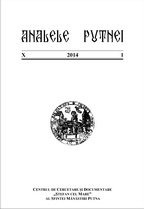„El Capitano Generale del Re d’Ungheria et del Valacho chiamato Stefano Vajovoda”. Statut şi prestigiu reflectate în limbajul diplomatic
“El Capitano Generale del Re dʼUngheria et del Valacho chiamato Stefano Vajovoda”. Status and Prestige Reflected in the Diplomatic Language
Author(s): Alexandru PînzarSubject(s): History
Published by: Centrul de cercetare şi documentare ŞTEFAN CEL MARE
Keywords: Stephen the Great; capitaneus; titles; diplomatic language; status
Summary/Abstract: The letter sent by Stephen the Great on January 25, 1475, “to the most high, most powerful and noble rulers from the entire Christendom”, in which he announced to the West the great victory from Vaslui, in the version preserved in the Venetian archives contains a note, attached, as it was proved, at the court from Buda, in which the ruler of Moldavia was called el Capitano Generale del Re dʼUngheria et del Valacho. Much was written about this note in the Romanian historiography, the note being regarded as a stain on king Matthias Corvinus’ memory, who, it was said, out of mean reasons claimed that Stephen the Great was the captain of his armies and won the battle of Vaslui due to the aids he sent. The analysis of the sources showed, however, that the attached note had the role of clarifying to the Westerners the status of the Moldavian ruler within the medieval hierarchy. The difficulties the Westerners encountered in understanding the status of the rulers from Suceava came also from the way the latter presented themselves in the titles or subscriptions of their own documents written in Latin. The Moldavian Chancellery tried to find equivalences in the Western nomenclature for the Slavonic-Byzantine titles, but wasn’t totally successful. Within this context, taking into account also the old rights the Hungarian kings held on Moldavia, denoting the ruler from Suceava as the king’s capitaneus was just an attempt to render the Slavonic vojevoda, that is, governor or king’s deputy. This title defined also the status of the Moldavian rulers and placed them, in the eyes of the Westerners, on the same level as the great local dignitaries of the neighboring kingdoms.
Journal: Analele Putnei
- Issue Year: 2014
- Issue No: 1
- Page Range: 143-155
- Page Count: 13
- Content File-PDF

